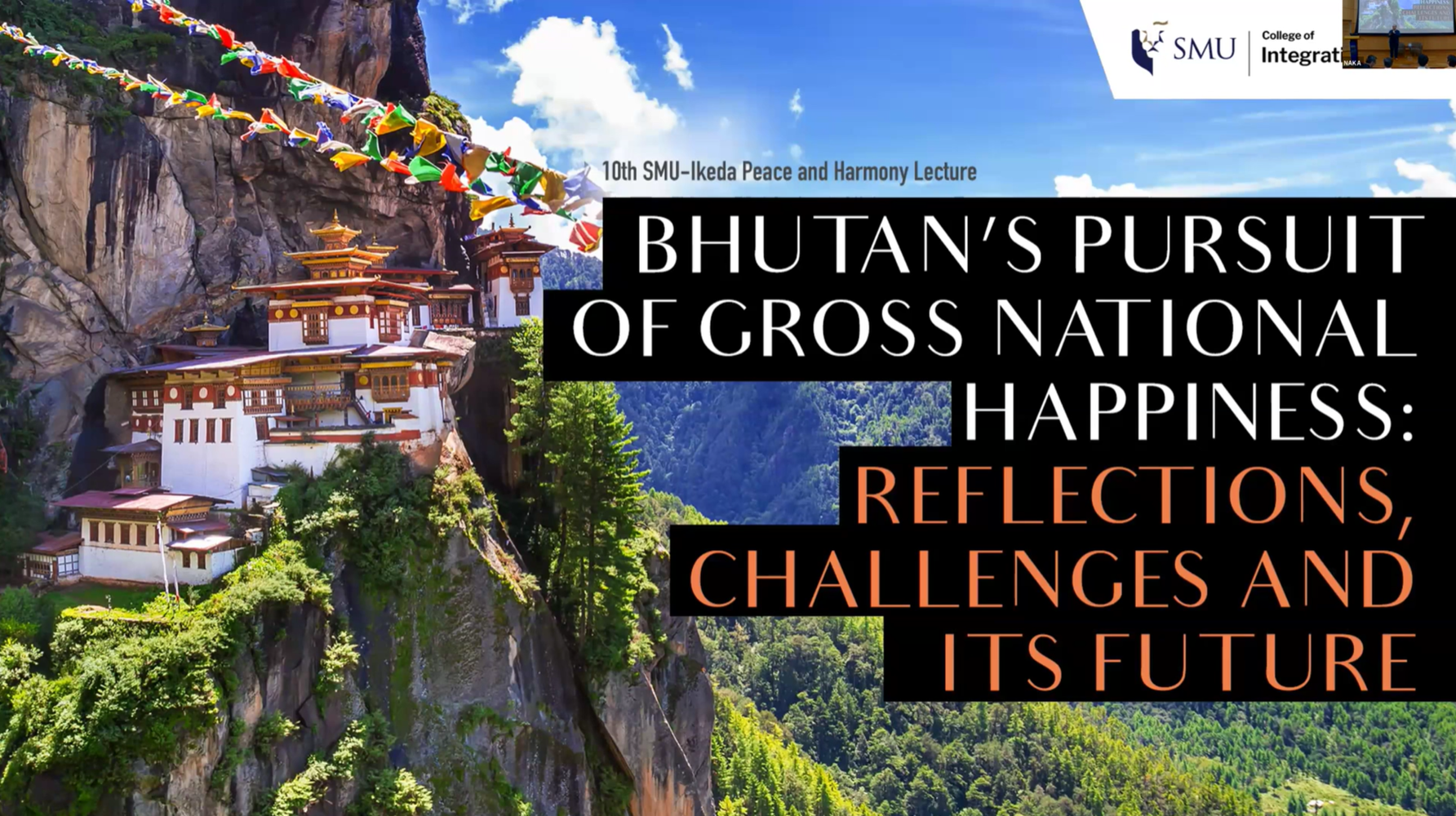Bhutan's Unique Path to Happiness (GNH)

Attending the public lecture, Bhutan’s Pursuit of Gross National Happiness: Reflections, Challenges, and its Future, was an eye-opening experience that offered a comprehensive look into Bhutan's unique approach to development. Presented by Kinzang Dorji, the Ambassador of Bhutan to various Southeast Asian nations, the lecture delved into the intricacies of Gross National Happiness (GNH) — a holistic measure of prosperity that goes beyond traditional economic indicators like GDP.
The Essence of Gross National Happiness
Imagine living in a country where progress isn’t measured by how much money people make but by how fulfilled they are as human beings. His Majesty the Fourth King, Jigme Singye Wangchuck, pioneered this bold idea of “development with human values,” and it’s not just a slogan—it’s embedded in Bhutan’s governance and way of life.
GNH: Four Pillars, Nine Domains, and 30+ Indicators
Bhutan’s Gross National Happiness (GNH) framework is nothing short of visionary. It’s not a vague ideal—it’s a carefully structured approach to balance the physical, emotional, and cultural well-being of its people. At the core of GNH are its four pillars, each representing a crucial dimension of happiness, supported by nine domains and over 30 indicators to measure progress. Here’s a closer look at what each pillar entails:

1. Sustainable and Equitable Socio-Economic Development
Bhutan doesn’t view economic growth as the enemy of happiness. Instead, the focus is on balanced and sustainable development that uplifts every member of society. Free education until high school is a shining example of this principle in action. Ambassador Dorji shared his own story, which brought this idea to life: for just $0.02, he received not only an education but also food from primary school through university.
Hearing him proudly say he was "born and made in Bhutan" struck a chord with me. It’s amazing how a nation with limited resources can achieve such equitable access to education, demonstrating that a country’s values—not just its wealth—define its progress. Bhutan’s model reminds us that sustainable development doesn’t mean rejecting growth but ensuring it benefits everyone, not just a privileged few.
2. Environmental Conservation
If there’s one thing Bhutan is globally celebrated for, it’s their commitment to the environment. The country is carbon negative, meaning it absorbs more carbon than it emits — a feat that advanced economies are striving towards. Bhutan’s forest cover, which spans over 70% of the country, plays a crucial role in this achievement.

Their "high value, low volume" tourism policy is another brilliant move. By capping the number of tourists allowed in and imposing a sustainable tourism tax, Bhutan ensures that its natural beauty is preserved while still benefiting economically. This policy might seem restrictive, but it’s a masterclass in managing resources responsibly. Listening to this made me wonder how other countries, especially those grappling with over-tourism, could adapt similar strategies.
3. Good Governance

Governance in Bhutan isn’t about power; it’s about service. This ethos was encapsulated in a remarkable moment in Bhutanese history: when King Jigme Singye Wangchuck voluntarily abdicated the throne at the age of 51 to introduce constitutional monarchy and democratic governance. His belief that “the king becomes king not by merit” was a humble acknowledgment that governance should evolve to reflect the will of the people.
Today, Bhutan has a 47-member parliament with clear qualification requirements and a retirement age of 65. The judiciary is also designed to serve happiness, ensuring peace, stability, and justice. Ambassador Dorji emphasized that the government’s role isn’t to impose happiness but to create enabling conditions for citizens to pursue it on their terms.
4. Preservation and Promotion of Culture
Bhutan’s culture is its soul—and it’s also its shield against the homogenizing forces of globalization. Geographically sandwiched by India and China, Bhutan’s unique identity sets it apart.

Take archery, for instance. It’s not just the national sport but also a cornerstone of Bhutanese community life. Ambassador Dorji shared how archery competitions foster social cohesion and celebrate peace and stability. They’re less about winning medals and more about the joy and bonding that emerge from those “small fights and competitive sessions.” It’s a beautiful reminder that happiness can be found in the simplest of things—like shared laughter and camaraderie.
Beyond sports, Bhutan’s vibrant festivals, traditional attire, and religious rituals keep its cultural roots alive. At the same time, this dedication to preservation isn’t without challenges. Striking a balance between honoring tradition and embracing modernity remains a constant balancing act, but Bhutan shows that it’s possible to hold onto your identity while moving forward.
Challenges in Implementing GNH in Bhutan
While Bhutan's Gross National Happiness (GNH) framework is widely admired, it faces significant hurdles in practice. These challenges highlight the complexities of balancing sustainable development, cultural preservation, and global integration in a small nation navigating rapid change.
1. The Hummingbird Analogy: Efforts Amidst Global Indifference

Ambassador Dorji likened Bhutan's GNH approach to the hummingbird trying its best to extinguish a forest fire. Bhutan is doing everything it can to embody sustainable practices, but without meaningful action from larger nations, its efforts feel insufficient. Climate change, for instance, cannot be addressed by Bhutan alone, even as it remains carbon negative. The advice to other nations is clear: slow down the exploitation of natural resources. Yet, global cooperation remains elusive, limiting Bhutan’s impact on broader environmental issues.
2. Misconceptions About Wealth and Happiness

There’s a prevailing fallacy that equates the West’s wealth with unhappiness and assumes that GDP growth inherently leads to dissatisfaction. Bhutan challenges this narrative by showing that GDP is not the enemy—it’s how it’s pursued that matters. However, this also creates skepticism globally, as critics often dismiss GNH as idealistic or unmeasurable.
The government’s role here is pivotal: to create conditions that allow citizens to pursue happiness. Ambassador Dorji aptly put it: “You can take the horse to the water but cannot make the horse drink.” Bhutan can only provide the framework; individual happiness ultimately lies with its people.
3. The Political Transition and its Downsides
The shift from monarchy to a democratic constitutional monarchy was a bold move, but it introduced new challenges. Democracy, while empowering, brings risks such as populism and resource diversion. Popular campaign promises like subsidies and handouts may win elections but don’t necessarily align with the long-term goals of GNH.
A notable example came from a mock election where voters expressed a preference for the king’s leadership (symbolized by yellow) over bureaucrats (red) or members of parliament (blue). This highlights the public’s enduring trust in the monarchy despite the democratic structure, raising questions about the effectiveness of majority rule in a GNH context.
4. Education and Youth Employment Challenges

Bhutan boasts 100% school enrollment and free education, but this success comes with its own set of issues. A mismatch between job market needs and skills, rising costs of living, and low income levels are pushing many young Bhutanese to seek opportunities abroad.
For instance, over 300 Bhutanese students study in Thailand with government-paid fees and a $400 stipend. Yet, most have no plans to return home. While some advocate for a bond system to retain talent, King Jigme Khesar Namgyel Wangchuck disagrees, emphasizing that students must make their own choices. Instead, he believes Bhutan must improve conditions so that young people voluntarily choose to come back—a sentiment that reflects Bhutan’s broader emphasis on intrinsic motivation over compulsion.
5. Balancing Traditional Values and Globalization

Bhutan’s commitment to cultural preservation is a cornerstone of its identity but also presents challenges in a globalized world. While protecting sovereignty, this focus can hinder social progress and limit individual freedoms.
Being landlocked and surrounded by two massive neighbors with over 1.4 billion people each adds to its constraints. A significant issue is Bhutan’s reliance on foreign medical institutions for advanced treatments. As Ambassador Dorji shared, his mother once asked, “Why can’t we have the medical treatment in Bhutan instead of outsourcing and paying so much for it?”
The answer lies in Bhutan’s prioritization of cultural and religious investments over healthcare infrastructure. While these traditions are vital to its identity, they reveal gaps in meeting modern needs, such as accessible medical care. Balancing cultural preservation with contemporary necessities remains a crucial challenge for Bhutan.
Solution
“We can never compete with the pay of Australia, so how do we keep people in Bhutan?”
To address this, the Gelephu Mindfulness City (GMC) was introduced as a vision to create a self-sustaining, vibrant economic hub that encapsulates Bhutanese values and the principles of GNH. Drawing inspiration from the ethos of mindful development, GMC aims to become a "mini-Singapore" that offers economic opportunities while staying grounded in ecological and cultural harmony.
Upon further research, I found out that the core idea of GMC centers on creating a “distributed economy”. This approach encourages scattered, locally driven production units that are interconnected through networks of trade, knowledge exchange, and collaboration. By situating economic activities within a broader ethical and cultural framework, GMC rejects conventional profit-driven models. Instead, it emphasizes ecological integrity, social well-being, and community resilience.
Key Features of GMC
- Integration of Rural Communities
- Rural areas will no longer serve as passive supporters of urban centers but become integral players in the economy. Farmers, for example, will have access to niche markets within the city to sell organic produce or crafts.
- Additional activities like ecotourism, farmers' markets, and craft-making cooperatives will be encouraged, promoting diverse sources of income.
- Focus on Innovation and Equity
- Smart agriculture utilizing AI and robotics can coexist with traditional farming practices to enhance productivity sustainably.
- Decentralized initiatives, such as local currencies and renewable energy, will support self-reliance while fostering interdependence within and between communities.
- Youth Engagement
- GMC could attract young entrepreneurs and professionals by offering a harmonious blend of modern opportunities and cultural grounding. For example, peri-urban farms could appeal to urban residents interested in agriculture, while smart villages may provide platforms for tech-savvy youth.
- Proximities in the Plural
- Ezio Manzini’s concept of “proximities in the plural” resonates strongly with GMC’s vision. It focuses on fostering a variety of opportunities in localities rather than limiting regions to specific economic functions. This approach not only bolsters the local economy but also strengthens human connections and cultural preservation.
Bhutan’s Vision for the Future
In the past, Bhutanese people found happiness in simplicity and contentment with what they had. However, in today’s world, there is a growing gap between the rising expectations of the people and what the government can realistically provide. To address this, Bhutan seeks to implement a “one country, two systems” approach. This vision involves building two distinct but complementary systems—one focused on preserving traditional values and the other on fostering socio-economic development. The ultimate goal is to integrate these systems to achieve a happy, literate, and socio-economically vibrant community.
Lessons for the World
The lecture’s most thought-provoking aspect was the comparison between Bhutan and other nations, particularly Singapore. Bhutan, with its half-hearted approach to material wealth, boasts a happier population than Singapore, where people have all the ingredients for happiness but report lower levels of satisfaction. This points to an essential truth: happiness is not solely about material success but also about intangible aspects like community, culture, and peace.
Bhutan’s example serves as a reminder that happiness, as a goal, requires more than economic prosperity. It demands sustainable policies, cultural respect, and a governance system that places people’s well-being at the heart of decision-making.
Ending Notes
Overall, the public lecture for the module Big Question: Happiness and Suffering was highly insightful. We had the chance to hear from the ambassador of Bhutan and gain an understanding of how people outside of Singapore pursue happiness. In the context of the module, this provided a modern perspective on national approaches to achieving happiness, enriching our overall learning experience.

Stay Tuned For Future Updates
University Life

